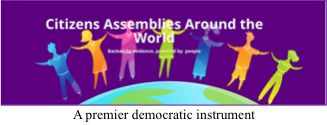Democracy has been producing some perverse results recently. A prime example is our neighbour to the south. In 2016, the American people elected Hillary Clinton, one of the most qualified candidates they have ever been offered for president, but they got Donald Trump, undoubtedly the least qualified candidate they have ever been offered. The people were overruled by an eccentric institution called the Electoral College. A similar result elected George W. Bush over Al Gore in the 2000 election. The Electoral College, it seems, has a soft spot for incompetents.
Another example is the Brexit referendum in Britain. I have (Read more…) in a previous post about the perversity of referendums in general and of this one in particular. That post also presents the much more democratic alternative, the citizens’ assembly—a set of citizens chosen randomly, to accurately represent the population, and then brought together to study the issue in depth. The group learns from experts and stakeholders, and consult and deliberate, before making their decision on the issue.
Fair Vote Canada pointed out in a recent article how citizens’ assemblies are gaining favour. In France, the Citizens’ Assembly for the Climate is tasked with developing a climate plan that cuts carbon emissions by 40 percent before 2030. A Citizens’ Assembly in Scotland will make recommendations to guide Scotland’s post-Brexit future. In the UK, the Citizens’ Assembly on Climate will direct the government on how to meet its goal of net-zero carbon emissions by 2050. The Irish Citizens’ Assembly will propose legislative changes to advance gender equality. Irish Citizens’ Assemblies, which have done groundbreaking work on gay marriage and abortion, are an international model for citizen participation. All the above will be reporting on their deliberations in 2020.
The German-speaking region of Belgium has even formed a permanent Citizens’ Assembly. All six parties in the region’s parliament endorsed the bill that established the assembly. Parliament will be bound to respond to its recommendations. This tiny community is setting an example for all of Europe. At a time when anger and distrust is troubling a number of Western democracies, they would do well to take a close look.
As could Canada. Citizens’ assemblies would be a useful addition to our governing institutions at all levels of government. Fair Vote intends to do everything possible to achieve a national citizens’ assembly on electoral reform in the current Parliament.

